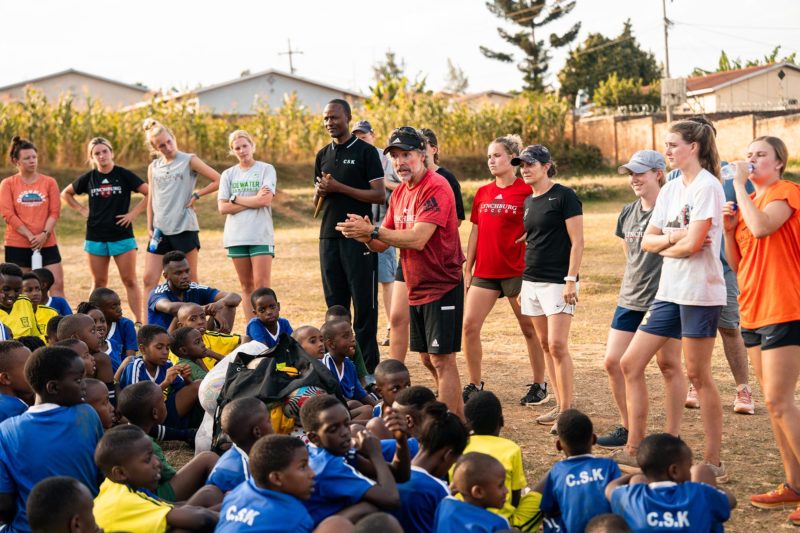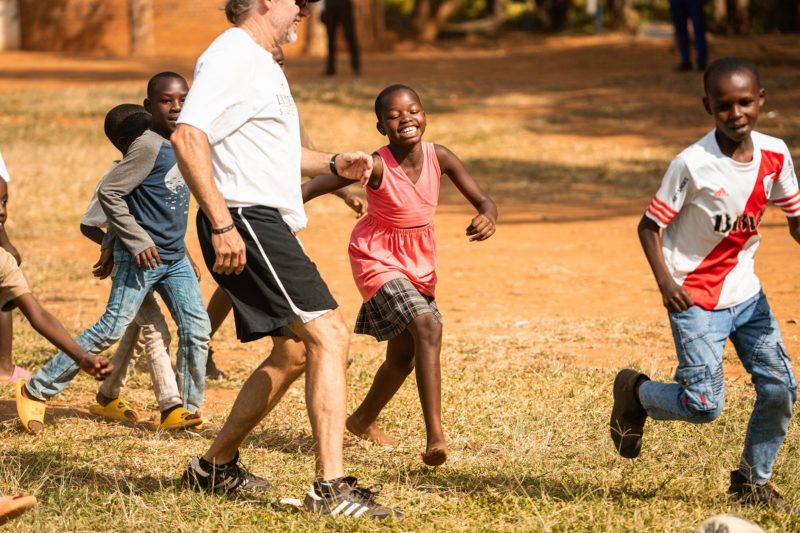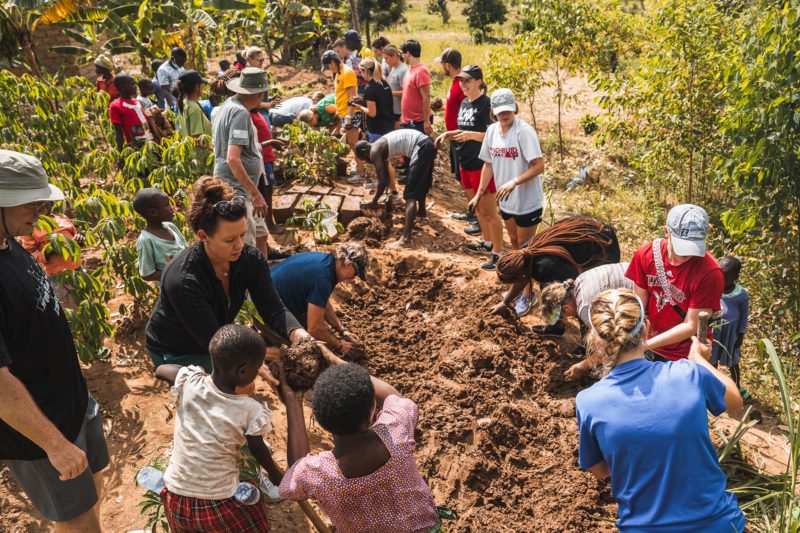
Pronounced po-lay po-lay, this Swahili phrase means “slowly by slowly.” Oftentimes, it’s used by hikers summiting Mount Kilimanjaro in Tanzania to remind themselves to take the 19,341-foot climb one step at a time.
Lynchburg women’ soccer head coach Dr. Todd Olsen points out the phrase also represents changes in gender equity in historically patriarchal societies across Africa.
This June, Olsen, some of his coaching staff and players, and a study abroad group from his Community Public Health in East Africa class spent two weeks in Rwanda.
The goal: continue affecting change through sport.
“The idea is you go into these developing countries, and you use sport as the model. You try to affect change through sport. We chose gender equity,” Olsen said.
Soccer, the most popular sport in the world, is an easy way to get your foot in the door, especially in Rwanda, where all you need is a ball, some space, and two teams eager for competition.
Without even speaking a word to the other team, Olsen and his class made attempts at giving women more opportunity in society through sport.

Olsen argues that sport is a microcosm for society. When teaching the local children baseball or lacrosse, the unfamiliarity in the sport for both boys and girls put them on the same playing field, he said. Without preexisting knowledge of those sports from North America, the boys were no better than the girls. However, with soccer, it was a much different story.
In Rwanda’s capital city of Kigali, Olsen’s group squared off in a soccer match with the Star School, an institution of 1,000 primary and secondary students.
Most of the “American” side featured women from Olsen’s soccer team. At first, the Star School rolled out a squad featuring an equal number of men and women. Just as Olsen said, sport mimics society, and in a patriarchal society like Rwanda’s, not all of the men were happy to be playing on a team with women.
Some of the Star School men weren’t exactly eager to pass the ball to their women teammates during the match. Frustrated that they were having a little more difficulty than expected scoring on their female opponents, the Star School slowly started subbing women for men, one by one.
“We got frustrated and wanted to step off the field,” Olsen said. “We swallowed our pride and kept playing.”
On the sidelines, the Rwanda women and girls started changing their rooting interest as the Star School subbed on more men. Eventually, children from the school and women in the crowd were rooting for the Americans as they demonstrated women deserve equal opportunity to men, even if it’s just on a soccer pitch.
“We were really frustrated,” women’s soccer associate head coach Natalie Deacon said. “We were having to remind ourselves that, slowly by slowly, what we were doing was not in vain. For the women watching, it was powerful for them.”
Deacon has joined Olsen on four trips to Africa since 2014. A national champion, All-American, and former multisport student-athlete at Lynchburg, Deacon has noticed improvements in gender equity each time she visits.
She recalled a particularly powerful moment when Olsen, her mentor for the last 10 years, spoke to a group from the community following a match where very few women took the field. As Olsen talked about the power and potential women have, especially in sports, Deacon watched the women in the audience smiling widely and nodding their heads in agreement.
She also remembers feeling proud when boys out on the soccer field were addressing their woman head coach, Coach Claudine, as “coach.” That’s something that would never have happened years ago, Deacon said, but now boys are getting used to seeing women in positions of leadership in Rwanda.
“You can’t come into a country and do it overnight,” Olsen said. Slowly by slowly, Olsen and his group have joined a larger movement of using sport as a way to encourage gender equity.
“Our purpose is to serve,” Olsen said. “You don’t have to be skilled in soccer to make a difference,” the hall of fame coach pointed out.

Olsen and his group helped make bricks for a community in Rwanda. Naturally, none of Olsen’s crew had any experience making bricks, especially using the 3,000-year-old process they were taught in Rwanda. However, everyone went to work in the muddy pit and busted out brick after brick. Seeing the appreciation from the community as families came to take and use the bricks made the hard work worth it.
Besides soccer and brick-making, Olsen indicated he saw some of the best chemistry among any of the groups he has taken to Africa. The camaraderie was on display during long bus rides across the country. Without phones to distract them, the group covered most of the miles talking with each other and sharing memories from the trip. They also talked about changes they saw and other things they will remember and bring back to the States.
“We think we have to have these special skills to serve and go on the trip. It’s not necessary. You just have to show up,” Olsen said.
Olsen has been showing up. He went on his first service trip 17 years ago and has brought 15 groups to Africa since then.
Each time, he sees progress, slowly by slowly. Of course, his expertise in soccer from 29 seasons of coaching helps. But just showing up and kicking a ball around has made all the difference.

